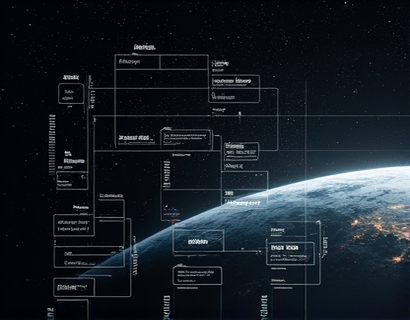Decentralized DAO Management: Maximizing Efficiency and Transparency with Advanced Analytics and Collaboration Tools
In the rapidly evolving landscape of decentralized finance and governance, Decentralized Autonomous Organizations (DAOs) have emerged as a transformative force. These organizations leverage blockchain technology to enable community-driven decision-making and autonomous operations. However, managing a DAO effectively requires robust tools and strategies to ensure efficiency, transparency, and informed governance. This article delves into the critical role of advanced analytics and collaboration tools in optimizing DAO management, focusing on how these technologies can enhance governance and drive sustainable growth.
Understanding DAO Governance Challenges
DAOs operate on a unique model where decisions are made collectively by token holders, often through on-chain voting mechanisms. While this model promotes decentralization and community involvement, it also presents several governance challenges. One of the primary issues is the complexity of managing large volumes of data and ensuring that all stakeholders have access to the information they need to make informed decisions. Additionally, the lack of centralized control can lead to inefficiencies and delays in decision-making processes. To address these challenges, integrating advanced analytics and collaboration tools is essential.
Advanced Analytics for Informed Decision-Making
Advanced analytics play a pivotal role in transforming raw data into actionable insights for DAO managers and members. These tools leverage machine learning and data visualization techniques to provide comprehensive analytics that help in monitoring DAO performance, identifying trends, and predicting outcomes. For instance, predictive analytics can forecast the potential impact of proposed governance changes, allowing the community to make more informed votes. Key performance indicators (KPIs) can be tracked in real-time, offering a clear picture of the DAO's health and progress towards its goals.
Data visualization tools are particularly valuable in making complex data accessible and understandable. Dashboards that display key metrics and trends at a glance enable stakeholders to quickly grasp the current state of the DAO. This visual representation of data facilitates better communication and collaboration, ensuring that all members are aligned and informed. Moreover, advanced analytics can help in risk management by identifying potential vulnerabilities and suggesting mitigation strategies, thereby enhancing the overall resilience of the DAO.
Enhancing Collaboration Through Advanced Tools
Collaboration is the cornerstone of successful DAO governance. Advanced collaboration tools are designed to streamline communication, streamline workflows, and foster a sense of community among members. These tools include project management platforms, discussion forums, and voting systems that are integrated into the DAO's ecosystem. By centralizing these functionalities, members can easily access the resources they need, reducing the friction associated with decentralized operations.
Project management tools enable the seamless coordination of tasks and responsibilities, ensuring that projects are completed on time and within scope. These platforms allow for the assignment of tasks, setting deadlines, and tracking progress, all of which are crucial for maintaining momentum and accountability. Discussion forums provide a space for members to engage in meaningful conversations, share ideas, and address concerns. This open line of communication is vital for building trust and fostering a collaborative environment.
Voting systems, when integrated with advanced analytics, can further enhance the governance process. These systems can be designed to provide real-time feedback on proposed changes, allowing the community to see the sentiment and support levels for each proposal. This transparency not only builds confidence but also ensures that decisions reflect the true will of the community. Additionally, gamification elements can be introduced to encourage participation and reward active contributors, thereby boosting engagement and community spirit.
Streamlining Governance with Automated Workflows
Automated workflows are a game-changer in DAO management, reducing manual effort and minimizing the risk of human error. By automating routine tasks such as vote tallying, report generation, and notification sending, DAOs can operate more efficiently. These automated processes ensure that governance activities are executed consistently and promptly, freeing up time for more strategic initiatives.
Smart contracts can be leveraged to create self-executing governance rules, where predefined conditions trigger automatic actions. For example, a smart contract can be programmed to release funds once a certain threshold of votes is reached, ensuring that financial decisions are both transparent and secure. This level of automation not only enhances efficiency but also builds trust among members, as they can verify the execution of governance actions through the blockchain.
Fostering Transparency and Trust
Transparency is a fundamental principle of DAOs, and advanced tools can significantly enhance this aspect of governance. Blockchain's inherent transparency is complemented by analytics and collaboration tools that provide real-time visibility into DAO operations. Members can access a wealth of information, from financial statements to project updates, all in a centralized and easily navigable format. This level of transparency fosters trust and accountability, as all actions and decisions are recorded and accessible to the community.
Audit trails and transparent reporting are essential components of a transparent DAO. Advanced analytics tools can generate detailed reports that highlight key metrics and performance indicators, making it easier for members to assess the DAO's progress. These reports can be made available to the public, further reinforcing the commitment to openness and integrity. By maintaining a transparent record of all activities, DAOs can build a strong reputation and attract more members and supporters.
Driving Sustainable Growth with Data-Driven Strategies
Sustainable growth is the ultimate goal for any DAO, and advanced analytics and collaboration tools are instrumental in achieving this objective. Data-driven strategies enable DAOs to make informed decisions that align with their long-term vision. By analyzing historical data and current trends, DAOs can identify opportunities for expansion, optimize resource allocation, and adapt to changing market conditions.
Market analysis tools can provide insights into the broader ecosystem, helping DAOs to position themselves strategically. For example, understanding the competitive landscape and identifying emerging trends can inform decisions on new projects or partnerships. Financial analytics tools can help manage budgets and investments, ensuring that resources are used effectively to drive growth. By leveraging these tools, DAOs can stay ahead of the curve and maintain a competitive edge.
Moreover, advanced analytics can support community engagement initiatives that are crucial for sustainable growth. By analyzing member behavior and feedback, DAOs can tailor their offerings to better meet the needs and expectations of their community. This data-driven approach to community management not only enhances member satisfaction but also increases participation and loyalty, which are vital for the DAO's long-term success.
Conclusion
In conclusion, the integration of advanced analytics and collaboration tools is essential for optimizing DAO management. These technologies address the inherent challenges of decentralized governance by providing efficient, transparent, and data-driven solutions. By leveraging these tools, DAOs can enhance their decision-making processes, streamline operations, and foster a collaborative and engaged community. As the decentralized ecosystem continues to evolve, embracing these advanced solutions will be key to unlocking the full potential of DAOs and driving sustainable growth.










































